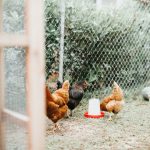Chicken care fundamentals encompass several critical aspects. Providing a secure living environment is essential, which includes a well-ventilated, predator-proof coop with appropriate roosting and nesting areas. Chickens require constant access to fresh water and a balanced diet consisting of grains, protein, vitamins, and minerals.
Sufficient space for roaming, foraging, and dust bathing is necessary to support natural behaviors. Chickens are social creatures that benefit from living in groups of at least three to four individuals. Enrichment activities, such as perches, toys, and outdoor access, contribute to their mental stimulation and overall well-being.
Regular health checks are crucial for maintaining optimal chicken health. This includes monitoring for signs of illness or injury, administering vaccinations, and implementing parasite control measures. Proper attention to these factors ensures the physical and emotional health of chickens, promoting a thriving flock.
By addressing both their basic needs and social requirements, chicken owners can create an environment that supports the natural behaviors and overall welfare of their birds.
Table of Contents
- 1 Staying Informed about Chicken Health and Nutrition
- 2 Keeping Up with Chicken Behavior and Social Dynamics
- 3 Learning about Chicken Breeds and Varieties
- 4 Staying Updated on Chicken Coop Maintenance and Design
- 5 Keeping Informed about Egg Production and Quality
- 6 Understanding the Legal and Regulatory Aspects of Raising Chickens
- 7 FAQs
Key Takeaways
- Providing a clean and safe living environment is essential for chicken care
- Regular health check-ups and a balanced diet are crucial for maintaining chicken health and nutrition
- Understanding chicken behavior and social dynamics can help prevent conflicts and ensure a harmonious flock
- Different chicken breeds have unique characteristics and suitability for various purposes
- Regular maintenance and proper design of the chicken coop are important for the well-being of the flock
Staying Informed about Chicken Health and Nutrition
Nutritional Requirements
A balanced diet for chickens should include a mix of grains, protein sources such as mealworms or soybean meal, and essential vitamins and minerals. Additionally, providing access to fresh greens and other forage can help supplement their diet and provide additional nutrients.
Monitoring Health and Nutrition
It’s crucial to monitor your chickens’ food intake and adjust their diet as needed to prevent obesity or malnutrition. Regular health checks can help catch any health issues early on, allowing for prompt treatment.
Preventing Disease and Maintaining Hygiene
Staying informed about common diseases in your area and taking preventative measures such as vaccinations and biosecurity protocols can help prevent the spread of disease within your flock. Finally, staying informed about proper hygiene and sanitation practices is vital in preventing the spread of disease.

Understanding chicken behavior and social dynamics is essential for maintaining a harmonious flock. Chickens are social animals that have a complex social structure within their flock. This includes establishing a pecking order, which determines the hierarchy within the group.
Understanding this dynamic can help prevent aggression and bullying within the flock. Additionally, being aware of common behaviors such as dust bathing, foraging, and roosting can help provide for their natural instincts and keep them mentally stimulated. It’s also important to be mindful of individual personalities within the flock.
Some chickens may be more dominant or assertive, while others may be more timid or submissive. Being aware of these differences can help prevent conflicts and ensure that all chickens have access to food, water, and other resources. Additionally, providing ample space and enrichment activities can help reduce stress and boredom within the flock.
Finally, being attuned to changes in behavior can help identify potential issues such as illness or stress within the flock.
Learning about Chicken Breeds and Varieties
When it comes to learning about chicken breeds and varieties, there is a wide range of options to consider. Different breeds have unique characteristics in terms of size, egg production, temperament, and appearance. For example, some breeds are known for their prolific egg-laying abilities, while others are prized for their ornamental plumage or docile nature.
Understanding these differences can help you select breeds that best suit your specific needs and preferences. In addition to considering breed characteristics, it’s important to be mindful of the specific varieties within each breed. For example, within the category of “Ameraucana” chickens, there are various color variations such as black, blue, and splash.
Each variety may have subtle differences in terms of egg color, feather patterns, or other traits. Understanding these distinctions can help you select chickens that align with your aesthetic preferences or breeding goals. Finally, being aware of heritage or rare breeds can help support conservation efforts and preserve genetic diversity within the chicken population.
Staying Updated on Chicken Coop Maintenance and Design
Maintaining a clean and well-designed chicken coop is essential for the health and comfort of your flock. Regular coop maintenance includes tasks such as cleaning out bedding, removing droppings, and checking for signs of wear or damage. This helps prevent the buildup of harmful bacteria and parasites within the coop.
Additionally, ensuring proper ventilation and insulation can help regulate temperature and humidity levels within the coop, which is crucial for preventing respiratory issues and heat stress. When it comes to coop design, there are several key factors to consider. This includes providing adequate space for your flock to roost, nest, and move around comfortably.
Additionally, ensuring proper lighting and access to natural sunlight can help regulate their internal rhythms and promote healthy egg production. It’s also important to consider predator-proofing measures such as secure latches, sturdy fencing, and hardware cloth to prevent attacks from predators such as raccoons or foxes. Finally, providing access to outdoor runs or free-range areas can help provide additional space for your flock to exercise and forage.
Keeping Informed about Egg Production and Quality

Identifying Potential Health Issues
Being aware of common issues such as egg binding or soft-shelled eggs can help you identify potential health problems within your flock. This knowledge enables you to take prompt action to address any underlying issues and maintain the health and well-being of your birds.
Optimizing Egg Quality
In terms of egg quality, it’s vital to consider factors such as shell strength, yolk color, and overall freshness. Providing a balanced diet that includes calcium-rich foods can help promote strong eggshells, while access to fresh greens can enhance yolk color. By focusing on these aspects, you can produce high-quality eggs that meet the demands of your customers.
Maintaining Egg Quality and Compliance
Proper storage and handling practices are critical in maintaining egg quality and reducing the risk of contamination. Furthermore, staying informed about local regulations regarding egg sales or distribution can help ensure compliance with food safety standards, giving you peace of mind and protecting your business.
Understanding the Legal and Regulatory Aspects of Raising Chickens
Understanding the legal and regulatory aspects of raising chickens is crucial for ensuring compliance with local ordinances and regulations. This includes considerations such as zoning laws, permit requirements, noise ordinances, and waste management regulations. Before starting a chicken-keeping venture, it’s important to research local laws and regulations pertaining to keeping poultry on your property.
This may include restrictions on the number of chickens allowed, setback requirements for coops, or guidelines for waste disposal. In addition to local regulations, it’s important to be mindful of broader legal considerations such as animal welfare laws and biosecurity protocols. This includes providing proper care for your flock, preventing the spread of disease between flocks, and ensuring humane treatment throughout their lives.
Staying informed about legal requirements can help prevent potential conflicts with neighbors or authorities while promoting responsible stewardship of your flock. In conclusion, raising chickens involves a wide range of considerations including care, health, behavior, breeds, coop maintenance, egg production, and legal aspects. By staying informed about these various aspects of chicken keeping, you can ensure the well-being of your flock while maximizing their productivity and compliance with legal requirements.
Whether you’re a novice chicken keeper or an experienced poultry enthusiast, ongoing education and awareness are essential for successful chicken husbandry.
If you’re looking for more information on keeping chickens, you might want to check out this article on how long it takes for chicken eggs to hatch naturally. It’s important to understand the breeding process if you’re considering raising chickens, and this article provides valuable insights into the incubation period. Additionally, if you’re interested in creating a garden chicken coop, or wondering if turkeys need a coop, Poultry Wizard has articles on those topics as well.
FAQs
What are some important things to consider when keeping up with chickens?
Some important things to consider when keeping up with chickens include providing them with proper shelter, food, water, and healthcare. It’s also important to ensure they have enough space to roam and engage in natural behaviors.
How often should I clean the chicken coop?
The chicken coop should be cleaned regularly to maintain a healthy environment for the chickens. This can vary depending on the size of the coop and the number of chickens, but a general guideline is to clean it at least once a week.
What should I feed my chickens?
Chickens should be fed a balanced diet that includes a combination of commercial chicken feed, grains, and kitchen scraps. It’s important to provide them with access to fresh water at all times.
How can I keep my chickens safe from predators?
To keep chickens safe from predators, it’s important to secure the coop with sturdy fencing and locks. Additionally, providing a secure shelter for the chickens to retreat to at night can help protect them from predators.
What are some common health issues in chickens and how can I prevent them?
Common health issues in chickens include respiratory infections, parasites, and egg-laying problems. To prevent these issues, it’s important to provide regular veterinary care, keep the coop clean, and provide a balanced diet for the chickens. Regular monitoring of the flock can also help identify and address any health issues early.
Meet Walter, the feathered-friend fanatic of Florida! Nestled in the sunshine state, Walter struts through life with his feathered companions, clucking his way to happiness. With a coop that’s fancier than a five-star hotel, he’s the Don Juan of the chicken world. When he’s not teaching his hens to do the cha-cha, you’ll find him in a heated debate with his prized rooster, Sir Clucks-a-Lot. Walter’s poultry passion is no yolk; he’s the sunny-side-up guy you never knew you needed in your flock of friends!







